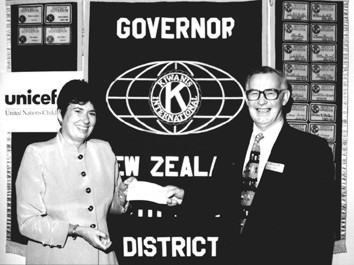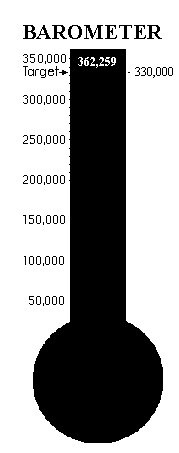Kiwanis target IDD:
Kiwanis International has accepted the challenge to eliminate iodine deficiency disorders (IDD) throughout the world.
IDD is the single greatest cause of preventable mental retardation in the world today. Kiwanis are working in partnership with UNICEF to ensure that IDD is eliminated in our lifetime.
Kiwanis Clubs throughout New Zealand and the South Pacific have raised NZ$362,259 in the six years to 25 August, 2000. It only costs 5 US cents to protect a child from IDD for a year. This means that we have given enough so far to save over 400 thousand children from mental retardation during this period.

|

|
| Photo by Woolf |
|
The IDD program is now closed for the New Zealand - South Pacific district. We
achieved our target in our five-year district effort to raise NZ$330,000
for this Kiwanis world service project. However, it did take us slightly
longer than anticipated to achieve our goal.
Our then Governor, Ian Calder, is shown above presenting a check for NZ$70,000 ($US50,000 at the time) to UNICEF New Zealand National President, Fran Wilde, in Wellington on the 4th of April, 1997. The amount donated to UNICEF is the result of a lot of hard work by a lot of dedicated people. We were pleased to participate in this International project, that provides a simple answer to a major problem. Research undertaken by UNICEF has identified that about one third of the world's population suffers from iodine deficiency disorders (IDD). Each month roughly a thousand babies will be born with cretinism. More than one million children will be born this year with partial deafness, retardation or other neurological impairments. All because mothers are iodine deficient. This disorder is preventable. Kiwanis International has pledged to raise $75 million worldwide to fund the UNICEF led program to eliminate IDD worldwide. The New Zealand - South Pacific District has pledged to support this effort and has sought to channel our financial support to a part of the world with which our members can identify. The district made an arrangement with the UNICEF to pay our contributions directly to UNICEF in New Zealand and have our contributions go entirely to Nepal. New Zealand has had a long association with Nepal ever since one of our most respected New Zealanders, Sir Edmund Hillary, based his successful expedition to first climb Mount Everest from Nepal in 1953. Sir Edmund has continued to be active in improving the life of the inhabitants of Nepal, including the building in 1956 of a hospital there. The hospital has been active in carrying out research on iodine deficiency disorders and their prevention. Our district was honored to have Sir Edmund speak to us at the public launch of the IDD campaign in the New Zealand - South Pacific District on 11 May, 1996 in Hamilton. |

|
|
District fundraising target achievement Final status - 25 August, 2000. |
Our program for Nepal has been extremely successful! Our district's contributions, together with funds from the international Kiwanis organization, have ensured the completion of the program to iodize all salt in Nepal with proper monitoring in place.
Consequentially, the district has sought an additional area of the world to which to channel our IDD funds. Another Himalayan country has been selected: Bhutan. Bhutan has had a long and unfortunate history of iodine deficiency disorders and has been the recipient of previous UNICEF programs to provide iodized salt. These programs, while initially successful, have deteriorated due to insufficient monitoring and equipment breakdowns. The Kiwanis funds to the country are already starting to make a difference in Bhutan. The initial UNICEF report on the Bhutan program (June, 1998) can be read by clicking here.